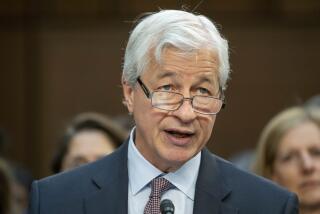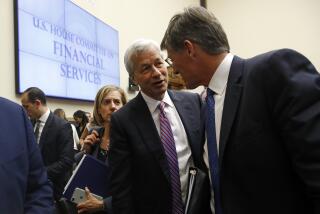Hiltzik: Will JPMorgan’s Dimon now shut up about the Volcker Rule?
- Share via
It’s a measure of how successful Wall Street has been at eviscerating the so-called Volcker Rule that in its current guise it would not have prevented JPMorgan Chase from making the derivatives trades that produced the stunning $2-billion trading loss disclosed this week.
Even in its weakened loophole-ridden state, the rule, which prohibits banks from making risky trades for their own accounts, has been raked with gunfire from Jamie Dimon, the JPMorgan chairman who presided over that loss. Chances are slim that he’ll eat his words, but it’s proper to review his attack, as I’ve reported in the recent past.
In a conference call in October, Dimon said the rule would interfere with America’s oh-so-efficient capital markets. I recounted those words in a column in January:
“The United States has the best, deepest, widest and most transparent capital markets in the world which give you, the investor, the ability to buy and sell large amounts at very cheap prices,” he said. “That is a good thing. I wish Paul Volcker understood that.”
Dimon has been on the warpath about all varieties of post-crash financial regulation. As I reported last October, he got into a shouting match with Sen. Dick Durbin over the “Durbin amendment,” which set limits on bank debit card fees, calling the limits “downright idiotic.” He’s complained that targeting the banking industry because of a few isolated misdeeds is misguided: “Sometimes there’s a bad apple, yet we denigrate the whole.”
And way back in April 2010, Dimon assessed the cost of any regulation of derivatives trading. The rules then being considered, he said in a conference call, could cost his bank “several hundred million to a couple billion dollars.”
Of course, he didn’t need the regulators’ help to achieve that. He cost his bank a couple billion dollars all on his own.
RELATED
Hiltzik: The attack on the Volcker Rule
J.P. Morgan’s egregious blunder
More to Read
Inside the business of entertainment
The Wide Shot brings you news, analysis and insights on everything from streaming wars to production — and what it all means for the future.
You may occasionally receive promotional content from the Los Angeles Times.











